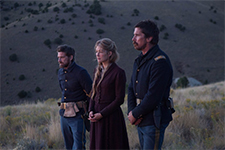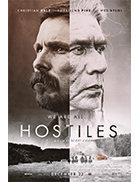Hostiles
|

Writing in 1984 in the second edition of his groundbreaking genre study The Six-Gun Mystique, John G. Cawelti reflected on the changes in the Western since the first edition was published back in 1970. The most prominent thematic shift he noticed, and one that was endemic throughout American cinema at that time, was the rise of moral ambiguity and the way the disintegrating boundaries between clearly demarcated "good" and "evil" had altered the Western at its core. "In the traditional Western," he wrote, "a very strong distinction was made between good violence (perpetrated by the hero) and bad violence (that used by the villains in pursuit of their evil aims)…. However, in a society so forcibly aware of the actual horrors of Vietnam and the Middle East, and of the rate of violent crime in America itself, violence portrayed as graceful or fun rings very hollow." Of course, Cawelti wrote those words more than three decades ago, during which time the Western has gone through several more cycles of regeneration and decline, with dozens of major titles both good and bad circulating through theaters. However, Cawelti's focus on moral ambiguity and the complications of violence as a marker of one's moral compass remains an important factor, and the best Westerns of the past 30 years—Kevin Costner's Dances With Wolves (1990) and Open Range (2003), Clint Eastwood's Unforgiven (1992), Jim Jarmusch's Dead Man (1996), John Hillcoat's The Proposition (2005), James Mangold's 3:10 to Yuma (2010), Ed Harris's Appaloosa (2008), and Kelly Reichardt's Meek's Cutoff (2010), to name a few—have used moral ambiguity to rework or, in some cases, fundamentally subvert, the most cherished tenets of the Western mythology. Scott Cooper's Hostiles fits right into that movement, although some of its ambitions stretch higher than the film, which is at times too somber and dirge-like for its own good, actually reaches. As the title would suggest, Cooper's film revisits the violent conflict between white European settlers and Native Americans. It recalibrates the derogatory term "hostiles," which has typically been used to dehumanize natives and therefore justify their elimination in the country's pursuit of "manifest destiny," and shows that it is equally applicable to both sides of the conflict. The film's opening scene, which depicts a renegade band of war-painted Comanche viciously attacking an isolated ranch, slaughtering the family in gruesome fashion, and burning everything to the ground, plays right into the old, hardline stereotypes of Native Americans as aggressive, savage, unrelenting murderers. Yet, the very next scene gives us the inverse, as we watch a group of U.S. Cavalry soldiers taunting and brutalizing a captured Native American. War, the film suggests in its opening minutes, brings out the worst in everyone. Yet, the film's ultimate goal is to encourage us to see past all the violence and recognize the possibility of common ground, of coming together, of seeing shared humanity even within those we have spent much of our lives considering as somehow less than human. The narrative vehicle for this moral regeneration is one of the oldest in the book: the journey. This particular journey, which is set in 1892, is led by Capt. Joseph Blocker (Christian Bale), a hardened military veteran of few words who has spent his career fighting Native Americans and, as a result, has come to loathe them (he is overseeing the torture in the film's second scene, which he does in a disturbingly dispassionate manner). He is assigned by his superior (Stephen Lang) to lead a convoy from Arizona to Montana for the purpose of returning Cheyenne Chief Yellow Hawk (Wes Studi) and his family, who have been imprisoned at Fort Berringer for seven years, to their native home in the Valley of the Bears so that he may die in peace (he is in the last stages of cancer). Blocker is, not surprisingly, resistant to this assignment since it is not only one of peace, but one that requires him to defend and protect a man who had been his sworn enemy (it is revealed early on the Yellow Hawk is responsible for the deaths of several of his friends, and at one point it appears that he is willing to take his own life rather than lead the convoy). It doesn't take much imagination to see that the journey will ultimately transcend the physical passage of space and time and become something more personal and spiritual, as Blocker's forced communion with Yellow Hawk allows him to see the chief as a fellow human being, rather than just an enemy. The journey is further complicated (and arguably enriched) by the presence of Rosalie Quaid (Rosamund Pike), the wife and mother in the family that is slaughtered in the film's opening scene. Having lost her husband and all three of her children (one of whom is an infant), she is shell-shocked into a nearly catatonic state when Blocker's band first discovers her in the charred remains of her home. Her literal revulsion at the sight of Yellow Hawk and his family is understandable given the circumstances, and her path back to some kind of humanity requires both the healing of her own mind and her recognition that not all Native Americans are the same—that those with whom she is travelling, despite having surface similarities to the men who killed her family, are fundamentally different. In this way, Hostiles is the moral inverse of Cooper's previous film, Black Mass (2015), which was narratively structured around an FBI agent's descent into complicity with vile South Boston gangster James "Whitey" Bulger. Cooper's screenplay, which was based on an original manuscript by Donald E. Stewart, who penned Costa-Gavras's Missing (1982) and wrote three Tom Clancy adaptations in the 1990s, has an obvious trajectory and is sometimes given to too much speechifying, which is perhaps best embodied in Rory Cochrane's grizzled Master Sgt. Thomas Metz, Blocker's best friend and the film's most direct representation of the slowly dehumanizing nature of violence ("I don't feel anything" is one of his last lines). Bale is subdued and quite magnificent as Blocker, a man who is used to keeping things buried deep inside; with minimal gestures and hard looks, Bale conveys the character's deeply ingrained bigotry while also suggesting a core of human decency that might allow him a path to redemption. However, like Eastwood's Unforgiven, Hostiles wants to have its cake and eat it, too, by decrying the horrors of violence while also deploying said violence in the final act as an audience-stirring means of cathartic retribution against racism and hatred. It's not a surprising turn, and it works on a very literal, direct, emotional level, but it's hard not to recognize how it undercuts what the film purports to be about. Copyright © 2017 James Kendrick Thoughts? E-mail James Kendrick All images copyright © Entertainment Studios Motion Pictures |
Overall Rating:



 (3.5)
(3.5)
Subscribe and Follow
Get a daily dose of Africa Leader news through our daily email, its complimentary and keeps you fully up to date with world and business news as well.
News RELEASES
Publish news of your business, community or sports group, personnel appointments, major event and more by submitting a news release to Africa Leader.
More Information
